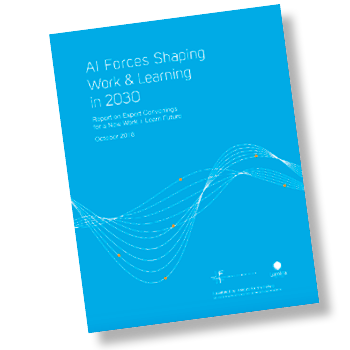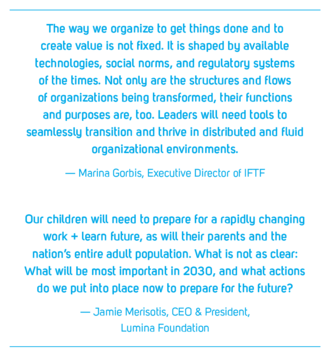
AI Forces Shaping Work & Learning in 2030
Report on Expert Convenings for a New Work + Learn Future
 What’s the connection between a non-profit foresight organization and a private foundation dedicated to improving education beyond high school? Simple: a shared desire to maximize individual opportunity, boost economic growth, and help ensure social stability.
What’s the connection between a non-profit foresight organization and a private foundation dedicated to improving education beyond high school? Simple: a shared desire to maximize individual opportunity, boost economic growth, and help ensure social stability.
Those goals are lofty, we know. But we at Institute for the Future and Lumina Foundation see this shared challenge—that of imagining tomorrow’s work + learn ecosystem—as one well worth taking. In fact, we’re convinced it is a challenge the nation must fully embrace. Read more in the AI Forces Shaping
Work & Learning in 2030 report.
Lumina Foundation focuses on meeting a specific national goal for education attainment: While 33.4% of Americans hold a postsecondary school degree today (according to Census Bureau data), by 2025, we want 60% of Americans to hold a degree, certificate, or some other type of high-quality credential beyond high school. We’re certain that such credentials will be increasingly important—both to individuals’ success and to the nation’s progress. But we know that today’s students—and tomorrow’s—face an uncertain future, fueled by major technological change and significant demographic shifts. That’s why Lumina is looking ahead, trying to imagine the coming work + learn ecosystem. Will degrees, certificates, industry certifications, digital badges, licenses, and other types of credentials be important verifications of learning in 2030 and beyond? And what will work, the key driver of credentialing, be like?

Institute for the Future (IFTF) focuses on developing a broadly shared understanding of tomorrow’s world—what we call a “global literacy of the future”—among the 9 billion globally connected citizens over the next 50 years. While IFTF’s core clients are corporations and governments, many education institutions are also seeking assistance. Increasingly, we recognize that rapid, significant social and economic changes require new ways to blend work and learning. Unfortunately, it’s difficult to identify the type of curricula that can properly prepare students to succeed in the next decade and beyond. IFTF has taken a step in this direction by creating a Future Skills tool that can help identify, promote, and deliver the 21st-century skills that are crucial to future success.
IFTF’s annual future forecasts interpret current signs of change and suggest new strategies for navigating this turbulent period of transition. The first step in that process is to gain expert insights—a step that IFTF and Lumina recently took by hosting more than 45 national thought leaders for focused conversations about the signals of change they see and what they portend. In this report, we’re pleased to share the first of two conversations with our common communities of interest: students, workers, employers, educational institutions, researchers, and policymakers.
We’re very grateful to the national experts who joined IFTF and Lumina for these conversations. Their insights offer vital perspectives to help shape the work + learn ecosystem.
Parminder K. Jassal, Ph.D.
Director, Work + Learn Futures
Institute for the Future
Holly Zanville, Ph.D.
Senior Advisor for Credentialing and Workforce Development
Lumina Foundation
Sign up for announcements, invitations, and special opportunities! Contact:
Curious about IFTF?
Interested in learning more about working with Institute for the future? Contact:
John Clamme | jclamme@iftf.org




